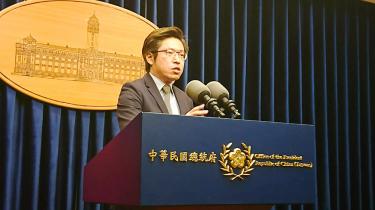The US Department of State has approved the sale of US$2.22 billion in weapons to Taiwan that includes M1A2T Abrams tanks and Stinger missiles.
The Bureau of Political-Military Affairs announced the sales and the US Defense Security Cooperation Agency formally informed the US Congress of the approval on Monday.
President Tsai Ing-wen (蔡英文) thanked the US government in a Facebook post, saying the weaponry would strengthen Taiwan’s national defense capacity and deter potential military threats, as well as ensure peace in the Taiwan Strait and the wider region.
The US government has used the 40th anniversary of the Taiwan Relations Act (TRA) to take concrete actions that realize its commitment to Taiwan’s security, Tsai wrote.
Earlier in the day, the Presidential Office issued a statement expressing “sincere gratitude” for the sale, with Presidential Office spokesman Xavier Chang (張惇涵) saying that the government would “speed up investment on defense and continue to deepen security ties with the United States and countries with similar ideas.”
In two statements issued on Monday, the agency said that the Taipei Economic and Cultural Representative Office has requested to buy 250 Stinger missiles, four Stinger fly-to-buy missiles, 108 M1A2T Abrams tanks and related equipment.
The principal missile contractor would be Raytheon Missile Systems Co, and the M1A2T prime contractor would be General Dynamics Land Systems, the statements said.
The Stinger missiles and related equipment would contribute to the Taiwanese military’s goal of updating its defensive capability, while further enhancing greater interoperability with the US and other partners, the agency said.
The proposed sale of the tanks “will contribute to the modernization of the recipient’s main battle tank fleet, enhancing its ability to meet current and future regional threats and to strengthen its homeland defense,” the agency said.
The sale of the tanks serves the US’ national, economic and security interests by helping “improve the security of the recipient and assist in maintaining political stability, military balance and economic progress in the region,” it added.
However, the deal does not include the 66 F-16V jets that the Ministry of National Defense requested in February.
The arms package had been stalled for some time amid concerns that the US government was holding back on weapon sales to Taiwan for fear of their possible effects on its trade talks with China.
The truce in the trade dispute reached between US President Donald Trump and Chinese President Xi Jinping (習近平) at the G20 summit in Osaka, Japan, and an agreement to keep talking might have allayed some of those worries.
The sales, announced as two separate packages by the agency, are the most substantive since Trump took office.
The deal shows that the US is normalizing its arms sales to Taiwan based on the TRA and the “six assurances,” the Ministry of Foreign Affairs said in a statement.
The arms sale is highly significant and beneficial for Taiwan to boost its self-defense capability, as the nation is on the front line of Beijing’s aggressive expansionism, the ministry said.
The deal would not affect cross-strait relations; instead, cross-strait peace and stability can be maintained only when Taiwan enhances its defense to deter potentially military aggression, it added.
China’s reaction to the US announcement was predictable.
The Chinese Ministry of Foreign Affairs yesterday demanded that the US “immediately cancel” the sale, and “stop military relations with Taipei to avoid damaging Sino-US relations and harming peace and stability in the Taiwan Strait,” spokesman Geng Shuang (耿爽) said at a regular news briefing in Beijing.
China has lodged formal complaints through diplomatic channels, he added.
Additional reporting by Lin Chia-nan, Reuters and AFP
Source: Taipei Times - 2019/07/10





















